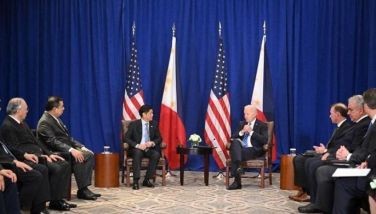PDEA: No direct evidence of bribery vs prosecutors in 'Alabang Boys' case
MANILA, Philippines - Officials of the Philippine Drug Enforcement Agency (PDEA) admitted there was no direct evidence but only possible circumstantial evidence to prove there was an alleged bribery of state prosecutors that led to the dismissal of the case of the so-called “Alabang Boys.”
Maj. Ferdinand Marcelino, head of PDEA special enforcement service, believes that the P800,000 deposited to the bank account of State Prosecutor John Resado on the day the complaint against drug suspects Richard Brodett, Joseph Tecson and Jorge Joseph was dismissed could be considered “circumstantial evidence” of the alleged bribery.
“We all know that drug deals are usually done with immediate payments upon delivery,” Marcelino told reporters at the continuation of the hearing of the panel created by President Arroyo to look into the case.
Marcelino gave this opinion after Resado again refused to waive his right under the bank secrecy law to justify where that amount really came from.
PDEA director general Dionisio Santiago said Resado’s admission that he signed the Dec. 2 joint resolution a day earlier, which incidentally was a special non-working holiday, is “a matter that posed more questions than answers.”
Resado agreed to have his bank account scrutinized in an earlier hearing but refused to sign a waiver surrendering his bank secrecy right yesterday before the three-man panel – just as he earlier did in the parallel investigation of House committee on dangerous drugs.
The independent committee chaired by retired Supreme Court associate justice Carolina Griño-Aquino was hoping to examine the passbooks of the joint account of Resado and his wife at the BDO branch in Bacoor, Cavite.
When he testified before the panel last Wednesday, Resado said he was willing to allow the investigating committee to scrutinize his bank account in an executive session. But in yesterday’s hearing, he changed his mind and decided not to sign a waiver that would allow investigation of his account.
Resado’s lawyer, Edinburgh Tumuran, said the embattled prosecutor only agreed to submit a bank statement from BDO detailing his transactions from September to December last year.
“There is a big difference between issuing bank statements and signing waiver. When you sign waiver, you are allowing AMLC (Anti-Money Laundering Council) the authority to investigate your account – including the source of deposits. My client does not want to waive such right,” Tumuran said.
He also revealed that Resado does not want to avail of any move that would incriminate him, especially after threats from the House panel to file criminal charges against him.
Also yesterday, a cousin of suspect Brodett testified before the independent panel and rebutted her cousin’s earlier testimony that he was not into drugs.
Amanda Brodett presented before the fact-finding committee a printed copy of the Friendster account of her cousin that allegedly showed him growing marijuana leaves.
But lawyers of the suspects asked the panel not to consider the testimony of the relative of Brodett, arguing it was immaterial in the case.
Getting their act together
Meanwhile, President Arroyo rounded up all of the country’s agencies involved in drug enforcement for a mandatory seminar yesterday on how to do their job better.
Focus was given on the procedural aspects of drug enforcement activities, particularly buy-bust operations, which was identified as the specific area “where lapses and technicalities are prone to be pointed out by defense lawyers.”
Dangerous Drugs Board chairman Vicente Sotto III pointed out that out of the total 99,754 illegal drugs cases filed from 2003 to 2008, only 22 percent were resolved. – With Marvin Sy
- Latest
- Trending































